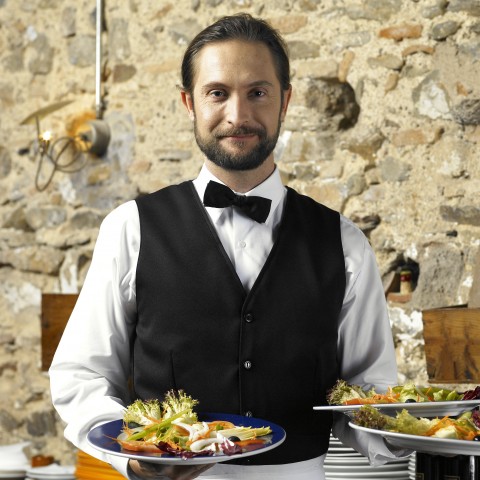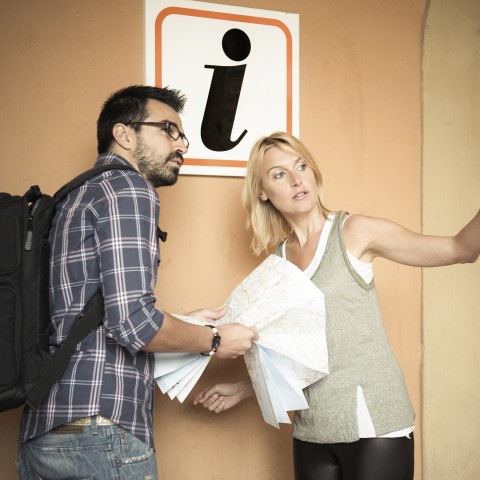
Learning a language means becoming familiar with a lot of different things: grammar, vocabulary, pronunciation… Each of these elements deserves attention and dedication. But as a beginner, it’s easy to feel stuck. Learning some handy and practical Portuguese phrases for beginners is a way to break through the initial roadblocks.
This is not to say you should overlook the more methodical, step-by-step study of Portuguese grammar. But pairing it with go-to phrases, expressions, and even slang terms can give you the boost you need in your language learning journey. Remember to also watch videos, listen to music, and tune into Portuguese conversations in order to practice your oral comprehension. Along the way, you’ll definitely encounter some of the beginner phrases from this article!
Today, you’ll learn basic Portuguese phrases you can use in a variety of situations and contexts. For some of the phrases, we have included a literal translation along with the natural translation; this way, you can identify both the practical uses of the phrase and the meaning behind the words. By the time you’re done with this article, you’ll have the tools you need to greet people and introduce yourself, use polite courtesy phrases, dine, shop, and get help from Portuguese speakers.

These Portuguese beginner phrases will help you deal with common situations!
 Table of Contents
Table of Contents
- Conversation Starters: Greetings and Self-introductions
- Being Social: Courtesy Phrases
- Spending Money: Dining & Shopping
- Don’t Be Shy, and Ask for Help
- Continue Learning with PortuguesePod101!
1. Conversation Starters: Greetings and Self-introductions
Picture this: You’ve just arrived in a beautiful city in Brazil. While you wait for your bus, a fellow traveler smiles at you and says Oi! (“Hi!”). Instead of panicking, stay calm and remember these basic introduction phrases!
Remember that, in most friendly and informal situations, you can start interactions with oi. Olá! (“Hello!”) also works, but it comes across as a bit more formal.
The following Portuguese beginner phrases will help you continue a quick conversation, present yourself, and say goodbye.
Greetings and Goodbyes
| Bom dia! | Good morning! |
| Boa tarde! | Good afternoon! |
| Boa noite! | Good evening! / Goodnight! |
| Oi, tudo bem? | Literally: Hi, all well? | Hi, how are you? |
| Olá, como você está? | Hello, how are you? |
| This is a more formal version of Oi, tudo bem? | |
When greeting, you can always add the name or the title of the person you’re talking to. For example:
- Bom dia, Luísa! Tudo bem? (“Good morning, Luísa! How are you?”)
- Olá professor, como você está? (“Hello, Professor. How are you?”)
| Tudo bem, obrigado. Tudo bem, obrigada. | Literally: All well, thank you. (masculine) All well, thank you. (feminine) | I’m well, thank you. (masculine) I’m well, thank you. (feminine) |
| Eu estou bem, obrigado. Eu estou bem, obrigada. | I’m well, thank you. (masculine) I’m well, thank you. (feminine) |
| Até mais tarde. | Literally: Until later. | See you later. |
| Até mais. | Literally: Until more. | See you. |
| Até logo. | Literally: Until soon. | See you soon. |
| Até amanhã. | Literally: Until tomorrow. | See you tomorrow. |
- → Learn how to pronounce each of these useful Portuguese phrases with our Common Ways to Say Hello vocabulary list.
Introductions
| Meu nome é [nome]. | My name is [name]. |
| Eu me chamo [nome]. | Literally: I am called [name]. | My name is [name]. |
| Qual é o seu nome? | What is your name? |
| Como você se chama? | Literally: How do you call yourself? | What is your name? |
| É um prazer te conhecer. | Literally: It’s a pleasure to meet you. | Nice to meet you. |
| In more casual situations, you could simply say prazer (literally “pleasure,” but meaning “nice to meet you”). | ||
| Eu tenho [idade] anos. | Literally: I have [age] years. | I am [age] years old. |
Eu sou (“I am”) is a handy, short way of giving some basic information about yourself, such as your name and your nationality.
| Eu sou o [nome]. Eu sou a [nome]. | I am [name]. (masculine) I am [name]. (feminine) |
| Eu sou [nacionalidade]. | I am [nationality]. |
| Eu sou do Canadá. Eu sou de Israel. Eu sou da Austrália. Eu sou dos Estados Unidos. | I am from Canada. I am from Israel. I am from Australia. I am from the United States. |
- → If you need to brush up on some words, be sure to check out the article Basic Portuguese Words for Beginners on PortuguesePod101.com.

Meu nome é Michael. (“My name is Michael.”)
2. Being Social: Courtesy Phrases
There’s a special set of words that children learn early on: the magic words! When learning a foreign language, it’s a good idea to take a child’s approach by also mastering the magic words. You know the ones: thank you, please, excuse me, I’m sorry…
Even if you’re not a fluent Portuguese speaker, knowing how to use these courtesy phrases is important as it will help you come across as more polite. Pair these phrases with a smile, and you can get a long way in Brazil!
- → Hear these courtesy phrases in context with this audio lesson and transcript by PortuguesePod101.
| Desculpa. | Literally: Apologies. | I’m sorry. |
Variations you can use:
| ||
| Perdão. | Literally: Forgiveness. | Pardon. |
| Me perdoe. | Forgive me. |
| Sinto muito. | Literally: I feel a lot. | I’m really sorry. |
| Com licença. | Excuse me. |
You can use this expression in two ways:
| |
| Obrigado. Obrigada. | Thank you. (masculine) Thank you. (feminine) |
| If you identify as male, always use the masculine form, regardless of the gender of the person you’re thanking. Same thing for the female form: If you identify as female, always use obrigada. | |
| Muito obrigado. Muito obrigada. | Thank you very much. (masculine) Thank you very much. (feminine) |
| De nada. Por nada. | Literally: Of nothing. For nothing. | You’re welcome. |
| Não faz mal. | Literally: It doesn’t do harm. | It’s alright. / No problem. |
| Não tem problema. | Literally: There isn’t a problem. | No problem. |
| Sem problemas. | No problems. |
| Por favor. | Please. |

Obrigada por me convidar para almoçar! (“Thank you for inviting me for lunch!”)
- → These phrases are a great place to start, but you can learn more about the most interesting and useful Brazilian customs & etiquette on our website.
3. Spending Money: Dining & Shopping
With just a few staple sentences, you can get by in a restaurant or a shop as you buy those basic things you’re sure to need when traveling. In addition to memorizing these Portuguese beginner phrases, try to also sharpen your vocabulary. Doing so will definitely spice up your shopping and dining experiences!
Phrases for Ordering and Paying
| Um refrigerante, por favor. | A soda, please. |
| Eu queria uma garrafa de água | Literally: I wanted a bottle of | I would like a bottle of sparkling |
| com gás, por favor. | sparkling water, please. | water, please. |
| Eu gostaria de uma limonada, por favor. | I would like a lemonade, please. |
| Eu quero uma lembrancinha do Brasil. | I want a souvenir from Brazil. |
| Vocês têm chinelos? | Do you have slippers / flip-flops? |
| Havaianas is the most famous Brazilian flip-flop brand, and the brand name is sometimes used synonymously with the word for “slippers.” | |
| Quanto custa a água de coco? | How much is the coconut water? |
| Fica quanto? | How much is it? |
| Posso pagar com cartão de crédito? Posso pagar com cartão de débito? Posso pagar com dinheiro? | Can I pay with a credit card? Can I pay with a debit card? Can I pay with cash? |
| Vou pagar com cartão de crédito. Vou pagar com cartão de débito. Vou pagar com dinheiro. | I’ll pay with a credit card. I’ll pay with a debit card. I’ll pay with cash. |
Dining-specific Phrases
| Posso ver o menu? | Can I see the menu? |
| Qual é o prato do dia? | Literally: What is the dish of the day? | What is today’s special? |
| Vocês têm prato feito? | Literally: Do you have a set dish/meal? |
| Prato feito, also called PF, is a popular (and often cheap) option in many Brazilian restaurants. It normally consists of rice, beans, french fries, meat, and a lettuce-and-tomato salad. | |
| Restaurante self-service | Pay-by-weight restaurant |
| This is a very common type of restaurant in Brazil. It is similar to a buffet, but instead of being an all-you-can-eat, its dining model requires customers to weigh their serving before eating. | |
| Restaurante à la carte | Restaurant with table service |
| This is a restaurant with a set menu and table service. | |
| Para aqui ou para levar? Para aqui ou para viagem? | Literally: For here or to go? For here or to travel? | For here or to go / takeaway? |
| Para levar. Para viagem. | Literally: To go. To travel. | To go. / Takeaway. |
| A conta, por favor. | The bill, please. |

Restaurante à la carte (“Restaurant with table service”)
4. Don’t Be Shy, and Ask for Help
At one point or another, we all need to ask for help. It happens to everyone, so don’t feel bad about it!
Sometimes, it might be a good idea to let people know that you’re still learning and might not understand everything they say. And in case it’s really necessary, you can always ask English speakers to give you a helping hand.
And of course, don’t forget to learn beginner Portuguese phrases for emergency situations.
Difficulties Understanding Portuguese
| Como? | Literally: How? | Sorry? |
| You could say Como? (“Sorry?”) if you didn’t hear or understand what someone just said. | ||
| Desculpe, não entendi. | I’m sorry; I didn’t understand. |
| Pode repetir? | Can you repeat? |
| Pode repetir mais devagar, por favor? | Can you repeat it more slowly, please? |
| Eu não falo português muito bem. | I don’t speak Portuguese very well. |
| Estou aprendendo português. | I’m learning Portuguese. |
| Você fala Inglês? | Do you speak English? |
| Não conheço esta palavra. | I don’t know this word. |
Finding Your Way
| Onde é o banheiro? Onde fica o banheiro? | Literally: Where is the bathroom? Where the bathroom stays? | Where is the bathroom? |
| Como chego no hospital? Como chego na academia? | Literally: How do I arrive at the hospital? How do I arrive at the gym? | How can I get to the hospital? How can I get to the gym? |
| Você sabe onde fica o restaurante? | Do you know where the restaurant is? |
| Desculpa, você sabe o nome desta rua? | Excuse me, do you know the name of this street? |
| Este ônibus passa no centro? | Literally: Does this bus pass downtown? | Does this bus stop downtown? |
- → Learn more about asking for directions with PortuguesePod101!
Emergencies
| Socorro! | Help! |
| Pode me ajudar, por favor? | Can you help me, please? |
| Eu preciso de um médico. | I need a doctor. |
| Eu preciso de ajuda! | I need help! |

Com licença, onde fica o Jardim Botânico? (“Excuse me, where is the Botanical Garden?”)
5. Continue Learning with PortuguesePod101!
Feeling ready to put these Portuguese beginner phrases to use? We hope so! This article will serve as a helpful cheat sheet for the most common situations you’ll find yourself in, so feel free to come back as many times as you need.
Was this article helpful? Do you think you’ll be able to deal with the common situations that you might face as a new Portuguese learner? Let us know if you think we missed anything!
If you want to take your speaking and listening skills to the next level, be sure to continue studying Portuguese grammar and vocabulary. You can get started by using any of the vocabulary lists or other free resources on PortuguesePod101.com.
Want to take your learning experience further? Members of PortuguesePod101.com get access to the largest language lesson library in the world, with thousands of real lessons by real teachers. Perfect for anyone who wants to learn from anywhere, feel motivated, and be ready to speak Portuguese with confidence.
Happy Portuguese learning!










